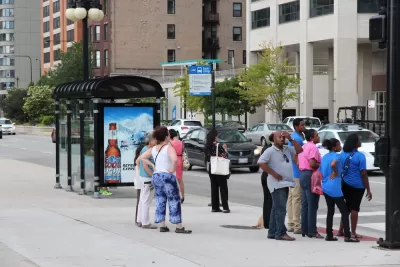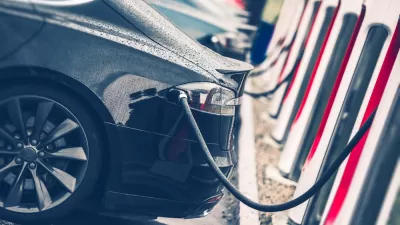Two companies focusing on hyper-local trips want to bring more transit and services within reach of Chicago’s underserved Black neighborhoods.

Two Black-owned Chicago companies want to use on-demand transportation to fill critical gaps in the city’s transit infrastructure. As Audrey F. Henderson writes in NextCity, Jitney EV and GEST are harking back to the informal jitneys that served Black residents when white cab companies often wouldn’t. Now, the two companies hope to bring electric, on-demand transportation to some of Chicago’s most underserved neighborhoods.
The services are not meant to compete with long-distance transportation to places like the city’s airports or suburbs. Rather, they’re designed to provide the short trips that many taxi and ride-hailing operators don’t want to make. “Their efforts are specifically targeting the ‘last mile’ gap between public transit stops and destinations such as grocery stores, banks and entertainment, along with providing an option for reliable transportation to and from work for residents within its service area,” said William “Billy” Davis, general manager for Jitney EV.
While it could be argued that more car-based services, even electric ones, could add to congestion, the companies argue that “Hyperlocal services could be a key factor in the ultimate goal of not only eliminating gasoline vehicles, but of reducing dependence on cars in the first place.” Meanwhile, free rides can connect more residents to jobs and essential services without the burden of transit costs.
FULL STORY: Black-Owned Companies Seek To Close Chicago’s Electric Transportation Gaps

Planetizen Federal Action Tracker
A weekly monitor of how Trump’s orders and actions are impacting planners and planning in America.

San Francisco's School District Spent $105M To Build Affordable Housing for Teachers — And That's Just the Beginning
SFUSD joins a growing list of school districts using their land holdings to address housing affordability challenges faced by their own employees.

The Tiny, Adorable $7,000 Car Turning Japan Onto EVs
The single seat Mibot charges from a regular plug as quickly as an iPad, and is about half the price of an average EV.

Seattle's Plan for Adopting Driverless Cars
Equity, safety, accessibility and affordability are front of mind as the city prepares for robotaxis and other autonomous vehicles.

As Trump Phases Out FEMA, Is It Time to Flee the Floodplains?
With less federal funding available for disaster relief efforts, the need to relocate at-risk communities is more urgent than ever.

With Protected Lanes, 460% More People Commute by Bike
For those needing more ammo, more data proving what we already knew is here.
Urban Design for Planners 1: Software Tools
This six-course series explores essential urban design concepts using open source software and equips planners with the tools they need to participate fully in the urban design process.
Planning for Universal Design
Learn the tools for implementing Universal Design in planning regulations.
Smith Gee Studio
City of Charlotte
City of Camden Redevelopment Agency
City of Astoria
Transportation Research & Education Center (TREC) at Portland State University
US High Speed Rail Association
City of Camden Redevelopment Agency
Municipality of Princeton (NJ)




























